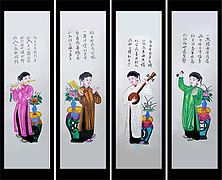
Back الدين الفيتنامي الشعبي Arabic Religión tradicional vietnamita Spanish Religion traditionnelle vietnamienne French សាសនាប្រជាប្រិយវៀតណាម Cambodian Religião tradicional vietnamita Portuguese Thanism Swedish Vietnam halk dini Turkish Vyetnam xalq dini Uzbek Tín ngưỡng dân gian Việt Nam Vietnamese 越南民間信仰 Chinese
This article should specify the language of its non-English content, using {{lang}}, {{transliteration}} for transliterated languages, and {{IPA}} for phonetic transcriptions, with an appropriate ISO 639 code. Wikipedia's multilingual support templates may also be used. (November 2021) |

| Part of a series on the |
| Culture of Vietnam |
|---|
 |
| History |
| People |
| Languages |
| Cuisine |
| Festivals |
| Music |
| Sport |
Vietnamese folk religion (Vietnamese: tín ngưỡng dân gian Việt Nam) or Đạo Lương (道良) is a group of spiritual beliefs and practices adhered by the Vietnamese people. About 86% of the population in Vietnam are reported irreligious,[1] but are associated with this tradition.
Vietnamese folk religion is not an organized religious system, but a set of local worship traditions devoted to the "thần", a term which can be translated as "spirits", "gods" or with the more exhaustive locution "generative powers". These gods can be nature deities or national, community or kinship tutelary deities or ancestral gods and the ancestral gods of a specific family. Ancestral gods are often deified heroic persons. Vietnamese mythology preserves narratives telling of the actions of many of the cosmic gods and cultural heroes.

Đạo Mẫu is a distinct form of Vietnamese shamanism, giving prominence to some mother goddesses into its pantheon. The government of Vietnam also categorises Cao Đài as a form of Vietnamese indigenous religion, since it brings together the worship of the thần or local spirits with Buddhism, Confucianism and Taoism, as well as elements of Catholicism, Spiritism and Theosophy.[2][3]